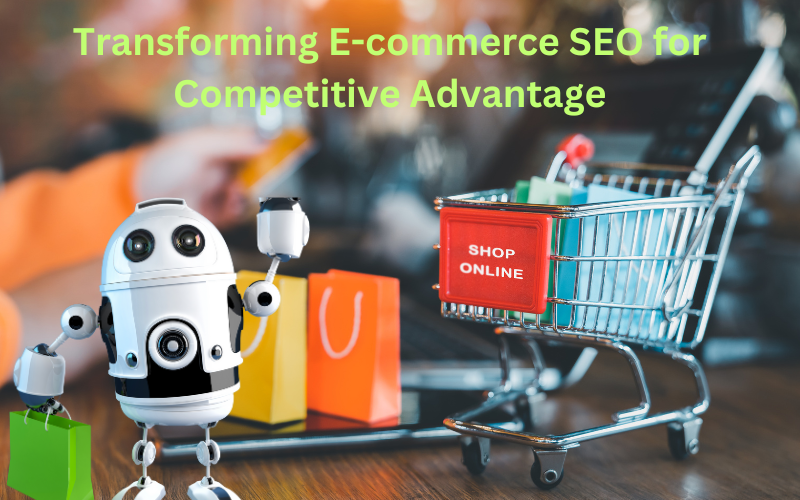In the rapidly evolving world of e-commerce, staying ahead of the competition is crucial for business success. Search engine optimization (SEO) has always played a pivotal role in driving organic traffic to websites, but with the advent of artificial intelligence (AI), it has taken on a whole new dimension. AI is now being used in a wide variety of ways to improve the e-commerce experience, from product recommendations to fraud detection. AI is revolutionizing the way businesses approach SEO, enabling them to gain a competitive advantage in the fiercely competitive e-commerce landscape. In this blog post, let’s explore how AI is transforming e-commerce SEO and the strategies you can leverage to stay ahead of the game.
SEO Transformation in e-Commerce
Businesses use AI to improve their e-commerce SEO. AI is changing e-commerce SEO in a variety of ways. Artificial intelligence can be used to:
Keyword Research: AI-powered keyword research tools can sift through massive volumes of data to find relevant keywords and long-tail phrases with the potential to deliver considerable organic traffic. These tools recommend the most lucrative keywords for targeting based on characteristics such as search traffic, competition, and user intent.
Competition analysis: By doing extensive competition analysis, AI systems give firms a competitive advantage. These tools may evaluate the webpages of rivals and find keyword gaps and possibilities. Businesses may identify untapped keyword potential and adapt their optimization efforts by comparing their own keyword strategies to those of rivals. AI-powered competition analysis assists firms in staying ahead of their competitors in the ever-changing SEO landscape.
Content Optimization: AI assists businesses in creating high-quality, relevant, and entertaining content. AI-generated content may aid in the creation of product descriptions, blog entries, and other information that is appealing to both consumers and search engines. Furthermore, AI-powered content analysis tools may evaluate content quality, readability, and SEO friendliness and make recommendations for improvement.
Voice Search Optimization: Voice Assistants’ Rise and Impact on E-Commerce SEO has changed the way organizations approach search engine optimization, necessitating the adaptation of their tactics to cater to voice search queries and give accurate and relevant information to consumers via voice-activated devices. Voice assistants like Amazon Alexa, Google Assistant, and Apple Siri have grown in popularity, altering how consumers search for information and interact with technology. Voice search’s emergence has had a huge influence on e-commerce SEO. As voice commands become more common, businesses must improve their websites to respond to voice search inquiries and remain competitive in the changing search market.
AI for Technical SEO: AI-powered audits can assist in identifying and resolving technical SEO issues on a website. Machine learning algorithms are used in these audits to examine numerous technical characteristics such as website architecture, URL structures, redirects, and broken links. AI-powered audits give practical recommendations for boosting technical SEO by finding problems such as duplicate content, missing meta tags, or inappropriate usage of header tags. This improves the performance of websites in search engine rankings and improves the user experience.


Website performance: AI algorithms may analyze website performance indicators, such as page load speed and responsiveness, to make suggestions for enhancing website speed, mobile optimization, and the overall user experience. To increase website speed, AI-powered technologies can identify bottlenecks and opportunities for improvement, such as image compression, code minification, or caching solutions. These guidelines guarantee that websites are optimized for both desktop and mobile devices in order to fulfill the expectations of current consumers and search engine algorithms. Furthermore, AI can evaluate user behavior data like bounce rates, time on page, and conversion rates to give insights into how to improve the user experience.
User Experience Optimization: AI-powered chatbots and customization technologies can improve the user experience on e-commerce websites. Chatbots may give real-time support and assistance, while tailored suggestions help adapt content and product recommendations depending on user behavior and interests. This can help firms increase revenue and enhance customer satisfaction.
Link Building: E-commerce businesses must use AI-powered link analysis tools to uncover high-quality and authoritative websites for prospective backlink chances. These tools verify that link-building activities fit with SEO best practices and offer successful results by evaluating link profiles and measuring website authority. The entire process becomes more efficient and simplified with AI-powered connection construction. Businesses may use AI technologies for link prospecting, outreach, and connection development, as well as work automation and communication improvement. Furthermore, machine learning algorithms offer predictive link-building, which enables firms to prioritize efforts and anticipate important link-building chances. Overall, implementing AI-powered link-building tactics improves website authority, search engine ranks, and organic traffic.
Monitor Performance: AI-powered analytics solutions may give significant insights into the SEO performance of an e-commerce website. Businesses may discover opportunities for optimization and make data-driven choices by watching indicators such as keyword rankings, organic traffic, and user engagement. AI also aids in competition analysis, allowing organizations to assess their performance and remain proactive in order to keep a competitive edge. Businesses may use real-time information to generate ongoing improvements in SEO results and increase organic traffic and conversions.
AI in SEO for e-commerce
Application of AI in e-commerce SEO is still in its infancy, but it is evident that this technology has the potential to transform the way businesses optimize their websites for search engines. Businesses may gain a competitive edge and get more visitors from search engines by embracing AI. AI is changing the face of e-commerce SEO, and numerous significant cases demonstrate its impact:
Amazon uses artificial intelligence to improve its product suggestion engine. AI algorithms provide tailored suggestions based on user behavior and preferences, enhancing consumer engagement and driving sales. This not only enhances the customer experience but also optimizes Amazon’s e-commerce platform’s conversion rates.
Walmart uses AI to optimize their website content for SEO. Walmart develops high-quality blog entries and product descriptions that are optimized for relevant keywords using AI-powered algorithms. This guarantees that their content ranks highly in search engine results pages, resulting in organic traffic and increased visibility to potential consumers.
eBay uses AI to analyze and enhance the SEO performance of its website. eBay uses AI to analyze critical indicators such as website traffic and identify the terms driving visitors to their platform. This information allows them to discover areas for SEO optimization, adjust keyword targeting, and increase search engine rankings.
Shopify, a major e-commerce platform, combines AI technology to help merchants optimize their online storefronts for search engines. The platform provides artificial intelligence-powered solutions for keyword research, content optimization, and website analytics. These solutions help retailers boost the SEO performance of their websites and generate more organic visitors.
Etsy, an online marketplace for handmade and antique goods, uses artificial intelligence for picture identification and labeling. AI algorithms scan product photos and produce appropriate tags automatically, increasing product exposure in search results. Sellers may use this to improve their product listings for search engines and attract a larger audience.
Magento, another prominent e-commerce platform, adds AI for tailored search experiences. To provide tailored search results and product suggestions, AI systems examine user data such as browsing history and purchase activity. This improves the user experience and raises the chances of conversion.
SEMrush is an SEO tool that uses artificial intelligence to perform in-depth keyword research and competition analysis. The application employs artificial intelligence algorithms to evaluate massive volumes of data, such as search patterns, competition strategies, and backlink profiles. Businesses may use this to gain important information and make educated decisions to improve their SEO performance.
Yoast SEO is a popular WordPress plugin that uses AI to provide real-time content analysis and optimization recommendations. The plugin employs artificial intelligence algorithms to evaluate the readability, keyword use, and general SEO quality of page content. It makes practical recommendations to help enhance and optimize content for search engines.
AI is changing the face of e-commerce SEO by enabling firms to enhance numerous areas of their online presence. Amazon’s tailored product suggestions, Walmart’s AI-driven content optimization, and eBay’s AI-powered SEO monitoring are all examples of AI deployment in e-commerce. Furthermore, platforms like Shopify and Magento make use of AI capabilities to assist retailers with keyword research, content optimization, and tailored search experiences. AI is used in SEO tools such as SEMrush and Yoast SEO to provide extensive analysis and real-time optimization recommendations. E-commerce websites may boost exposure, attract organic traffic, and increase conversions by employing AI’s skills in monitoring user behavior, delivering targeted content, and offering data-driven insights. Further advancements in e-commerce SEO are predicted as AI technology progresses, allowing firms to survive in the dynamic digital market.
The Importance of AI in E-Commerce SEO
AI has a promising future in e-commerce SEO. As AI technology advances, we should expect to see even more creative methods to employ AI to increase e-commerce website exposure on search engine results pages.
Among the possible future advances in AI-powered SEO are:
- AI-driven semantic analysis would make it possible for businesses to interpret user inquiries and modify their websites accordingly.
- AI-driven personalization would make it possible for businesses to cater product recommendations and other aspects of the purchasing process to each individual customer.
- AI-enabled fraud detection: This would assist businesses in identifying and preventing fraudulent activity on their websites.
These are just a handful of the probable advances in AI-powered SEO in the future. As AI technology advances, we should expect to see even more creative use of AI to improve the e-commerce experience.
Thus, AI is transforming e-commerce SEO, providing businesses with a competitive edge. Businesses that harness the power of AI SEO for e-commerce will be well-positioned to optimize their websites, attract organic traffic, increase conversions, and ultimately thrive in the fiercely competitive e-commerce landscape. Embracing AI in SEO strategies is not just a competitive advantage; it has become an essential element for long-term success in the rapidly evolving world of e-commerce.


